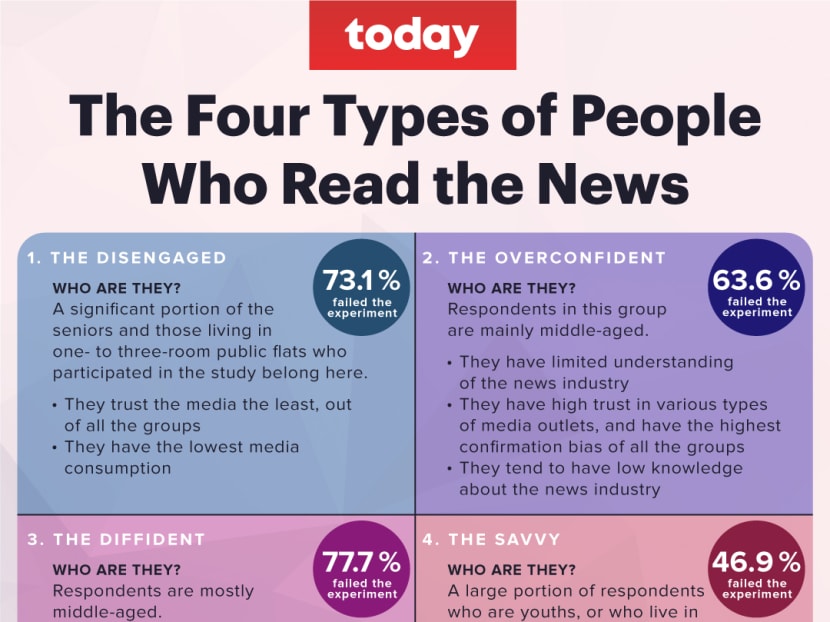Study finds seniors, public flat dwellers more vulnerable to fake news, with two-thirds of respondents failing experiment
SINGAPORE — More than two-thirds of Singaporeans are unable to discern between real and fake news, especially seniors and those living in smaller public flats. This is one of the findings from a study released by the Institute of Policy Studies (IPS) on Thursday (Dec 17).

A study by the Institute of Policy Studies found that even news-savvy Singaporeans were susceptible to believing fake news.
- An Institute of Policy Studies study found that most Singaporeans were unable to detect false information
- The groups more likely to fall prey to misinformation include seniors and those who trust non-traditional sources of news
- Political traits and educational backgrounds have little bearing on a person’s susceptibility to fake news
- Even then, no one, not even the most informationally savvy people, is immune from fake news, one researcher said
SINGAPORE — More than two-thirds of Singaporeans are unable to discern between real and fake news, especially seniors and those living in smaller public flats. This is one of the findings from a study released by the Institute of Policy Studies (IPS) on Thursday (Dec 17).
The study’s authors, who interviewed 2,011 respondents face-to-face between Nov 1 and Dec 31 last year, looked into how susceptible Singaporeans are to false information.
To measure this, respondents were shown a manipulated news article — fake news — and asked to determine its trustworthiness.
Only 32.5 per cent of respondents correctly said that the article was not trustworthy.
The rest believed its contents to various degrees — 27 per cent said that it was somewhat trustworthy, and 40.6 per cent graded it as either trustworthy or very trustworthy.
Other studies have looked at how Singaporeans consume and sieve out fake news. In 2018, a similar study by market research firm Ipsos tested participants with several authentic and false headlines and found that 45 per cent of respondents had believed a fake news story.
In a media briefing on Thursday, the two IPS researchers, senior research fellow Carol Soon and research assistant Shawn Goh, said the study showed that a person’s susceptibility to fake news was related to several demographic, socio-economic and psychological factors.
Respondents’ education levels and political traits — such as whether they are politically active or lean towards certain ideologies — were also analysed, but researchers found little to no link between these factors and their ability to detect false information.

This is despite international studies conducted in more politically divided countries that found political traits played a large role in people’s susceptibility to false information, Mr Goh said.
He added that while there is much polarisation seen in countries such as the United States, the political landscape in Singapore features more middle-ground consensus.
“We did not find any effects of political traits in our regression analysis (of people’s vulnerability to fake information), and the key reason for this is probably because of the different political landscape in Singapore.”
What the survey did find was that differences in people’s news consumption habits, knowledge of the media landscape, and their trust in non-traditional media such as social networking sites, have a bearing on how vulnerable they are to fake news.
Among the various media, the most trusted sources of news were television, print newspapers, radio, and websites of mass media outlets such as CNA, TODAY and The Straits Times.
Online forums, instant messaging, social networking sites, podcasts and online-only non-mainstream news sites in Singapore, such as The Online Citizen and Mothership, were the least trusted, the study found.
SENIORS, PUBLIC HOME DWELLERS MORE SUSCEPTIBLE TO FALSEHOODS
The researchers noted that a relatively large proportion of poll participants — those who are generally older and who mostly live in public housing, especially one- to three-room flats — had wrongly placed their trust in the study's manipulated article, by around 70 per cent on average.
However, even within the most “informationally savvy” group of respondents, a significant 46.9 per cent of those people still wrongly trusted the fake article.
This group comprises the highest proportion of youth as well as those who live in private housing. They consumed news media the most, but also had relatively low trust in both traditional and non-traditional media.
Dr Soon, who is also the head of society and culture at IPS, said: “Clearly, as we have found in this study, no one is immune to false information and we have seen that even (those who are) really savvy can and are susceptible to false information.”
Other findings showed that fewer than half — 47.1 per cent — of respondents were confident about their ability to detect fake news. The rest were either ambivalent or pessimistic about doing so, and were “quite cynical” about people’s interest and ability to tell real information from falsehoods.
Worryingly, people who encountered false information mostly chose to ignore the falsehood rather than debunking it, Dr Soon said. This “inaction” showed that there is a perception that false information is a problem for others to solve.
Furthermore, the top reasons given by those who passed the false information onto others said that they did so because the news seemed important, had come from close friends and family, and the information was new and eye-catching.
The study underscores a need to reinforce digital literacy efforts, especially those that target seniors and those with lower socio-economic statuses, especially at a time when the Government is making efforts to give these groups greater accessibility to technology, the researchers said.
“What our study clearly shows is that in addition to increasing access and helping people navigate and use the basic functions of technology, it is also important to work and increase their digital literacy,” Dr Soon said.











